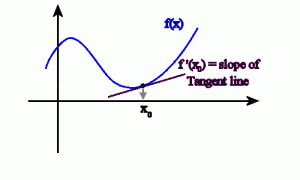I just watched Angels and Demons for the first time on Netflix. It’s nothing too deep, but from a storytelling point of view, it was the most engaging, plot-twisty movie I’ve seen in a long time (I admit, I’m pretty media-deprived). Everything from the visual effects to the wonderful score by Hans Zimmer kept me sucked in to the story and wondering what was going to happen next: Who’s the bad guy? Where’s the bomb? When is Ewan Macgregor going to break into song? Sure, there were significant plot holes, but the big climax was the ultimate in emotional engagement, followed by a plot twist that completely changed the affective imprint of the movie and left me feeling winded.
This kind of storytelling makes me think of derivatives. You know, the slope of the line tangent to a curve. Good stories are always curves. They never progress in a straight line; you can never predict their path from any one point. But the mind can only make linear predictions, so in order to experience a story, we constantly find derivatives along each point. The reason why plot twists are so successful is because the story must first set up a linear progression that causes you to become invested in the story and its logical outcome—then, after you’ve been wrenched through a heartbreaking scene, it pulls you away from the tangent and back to the curve of the story, feeling emotionally betrayed but ready to lose yourself in the next derivative. The most satisfying story is a series of derivatives that exact a series of emotional investments, each engaging and exhausting, but only the last of which turns out to be true.
This is life, as well: a series of plot twists, punctuated by scenes that engage us at the moment, but are often forgotten as the story progresses. Children are melodramatic about the tribulations of friendships and crushes and fourth grade teachers, but their experiences should be validated for the life-changing moments that they are, however early in the story they happen to be. Just because an emotional assertion will be forgotten or altered as the story progresses doesn’t lessen its severity or impact. If anything, the opposite should be true.
The first time I ever watched Lord of the Rings, I hadn’t read the books and didn’t know what was going to happen. The only thing that really surprised me was the end of The Return of the King, when Frodo and Sam are lying on a rock on Mt. Doom after destroying the ring. Hot lava is pouring around them as they mourn their certain death and declare their friendship “here, at the end of all things”. I knew for sure that they were going to die, and it was heartbreaking.
Then the eagles come out of nowhere and bring them to safety, and I thought it was a horrible emotional cheapening of a heartrending story. But it wasn’t. Instead of only being invested in one storyline, the one where they die, I could now experience two: one where they die, and one where they live. Plot twists, and the tangents that are abandoned in their wake, are a gift of multiple stories, multiple possibilities, multiple exercises for the heart.
The biggest plot twist so far in my own life is my deconversion, and I view it as such a gift. My time as a Christian was brilliant, satisfying, deep, full of emotion, richly multi-dimensional. Of course, those kinds of vistas make for the most devastating plot twists. And as in all stories, the immediate aftermath of such devastation is a sense of emotional betrayal, a feeling that the previous story was false in its import. But I don’t see the old me as having been wrong or foolish or misled. Instead, I love that part of my life for what it was: a wonderful time that engaged me. A wonderful relationship with God that was real to me then, and is not negated by where I am now. If life can be viewed as a story (and a story as a mathematical function), it is a diverse set of derivatives that are all valid in their moment.
Movies and books can be re-read and re-watched, but their emotional impact lessens upon repeating. You can only be fully invested in a wrong tangent once, and that’s a shame, because the first time through an unknown story is the most enjoyable. But life can only be experienced once, so here’s the inevitable, much-clichéd conclusion: live in the present, but don’t discount the past. Love every derivative. It would be so boring if everything turned out the way we predicted from the first page. And equally as boring if we only accepted the end of the story as worthy of recognition.

